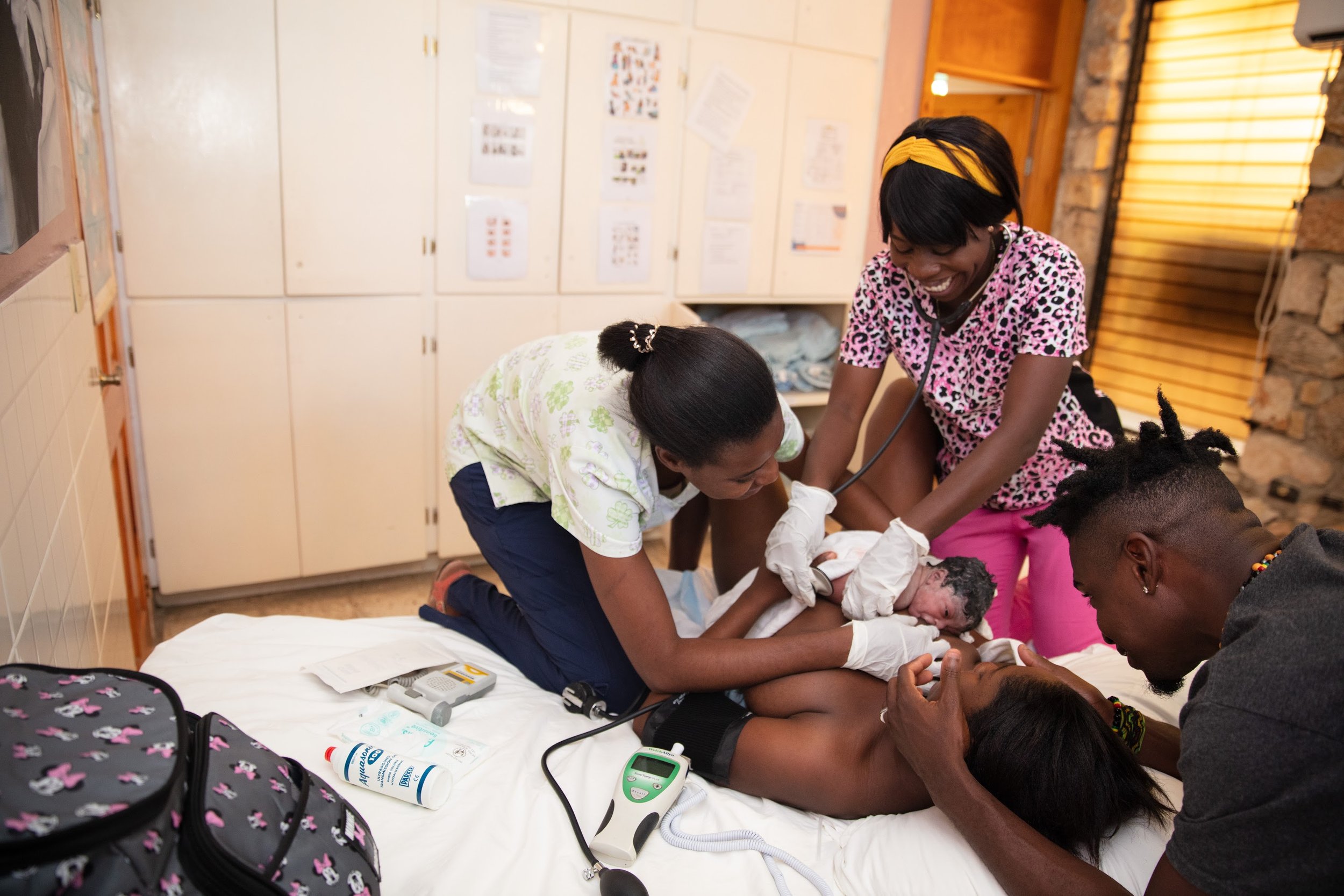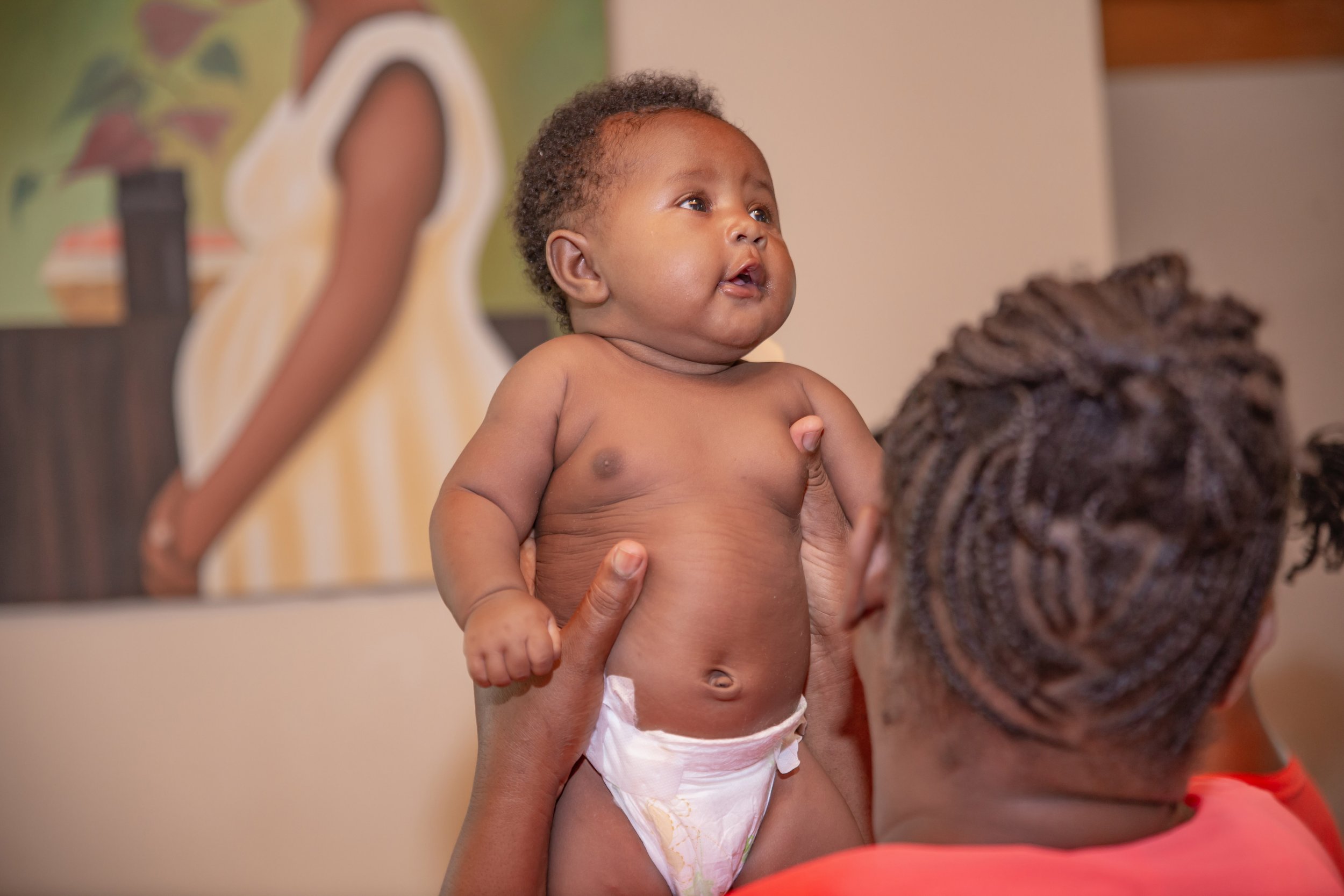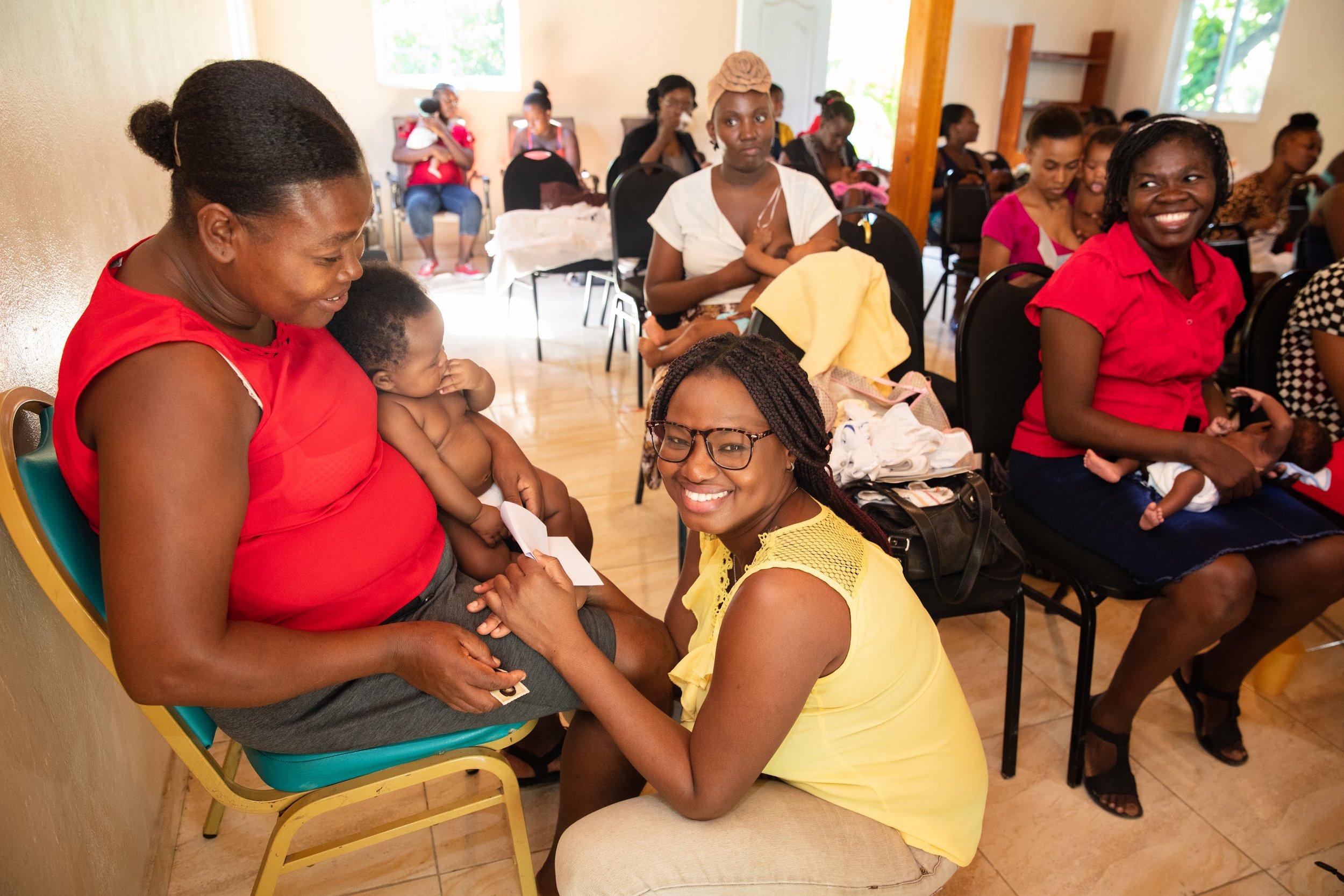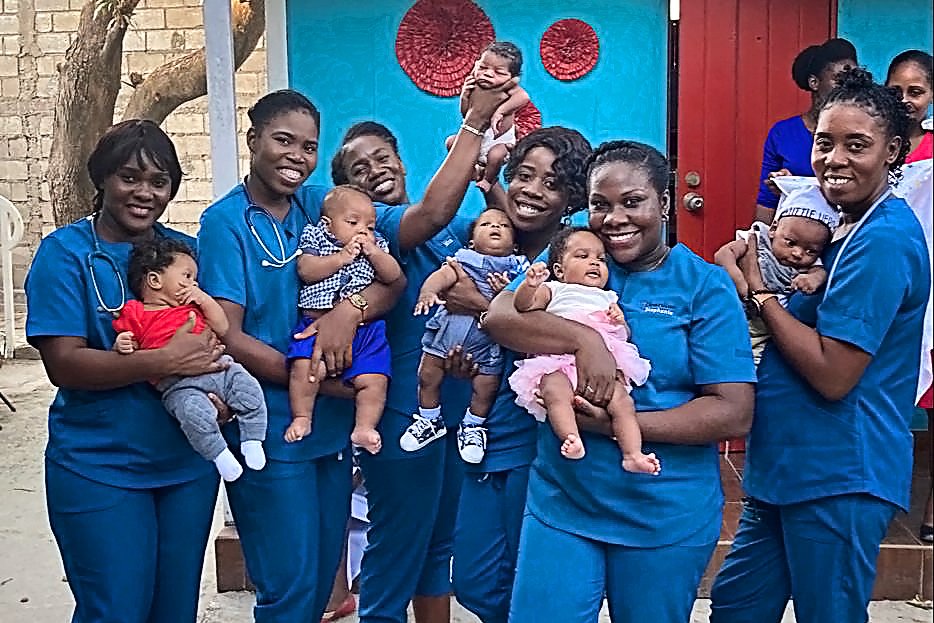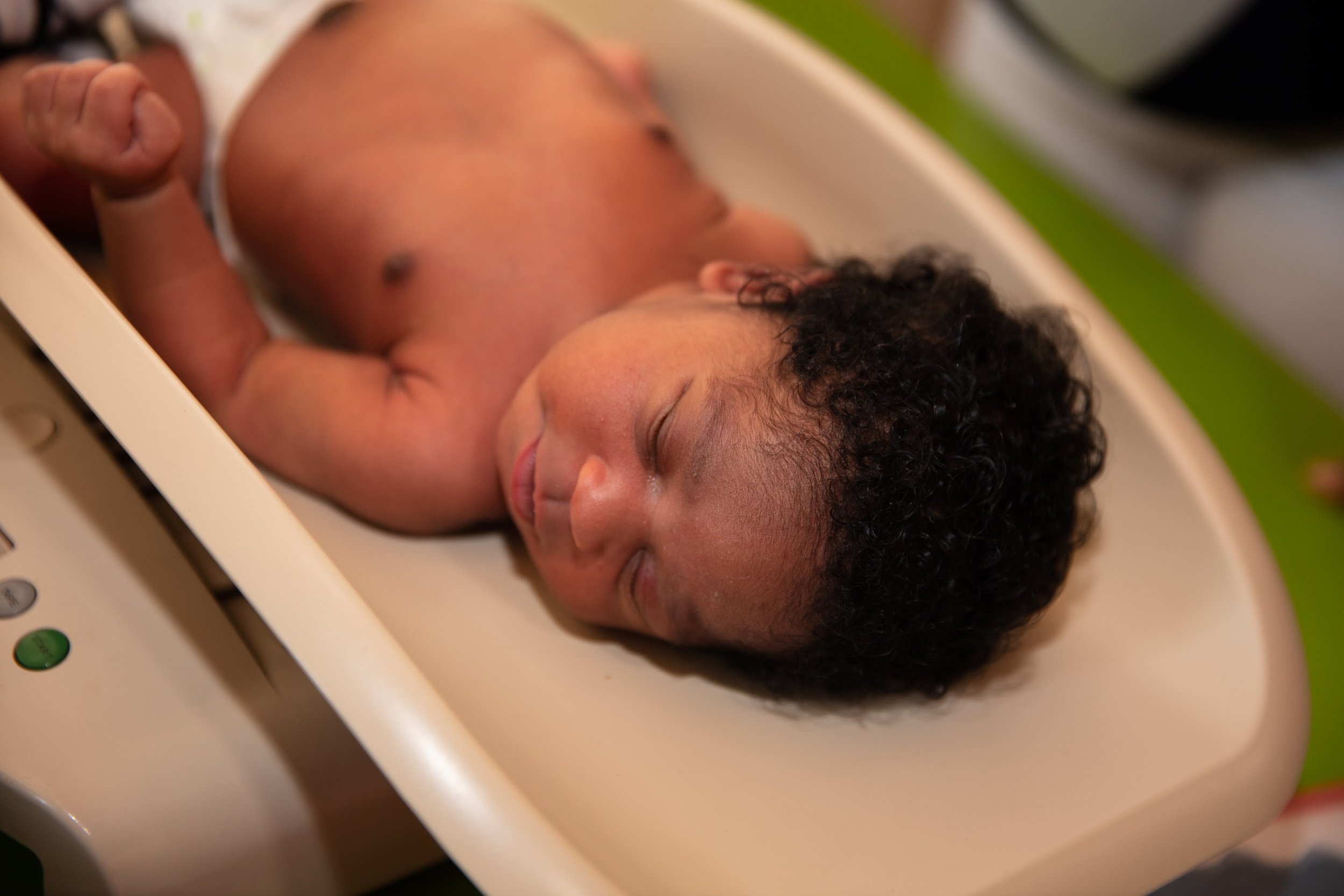
Maternal & Infant Healthcare
Maternal Healthcare in Haiti
Simply giving birth in Haiti puts a woman at risk. Haitian women face a 1:94 chance of dying from complications in pregnancy or during childbirth – compared to a 1:2700 chance in the United States. It’s almost 30 times as dangerous to become a mother in Haiti.
The Heartline Maternity Center
At Heartline’s Maternity Center in Port-au-Prince, we offer high-quality, compassionate, and affordable maternal & infant healthcare – from prenatal classes, to birth, to postpartum checkups. The Center is completely led by Haitian nurses and midwives, working day-in and day-out in a country where hospital care is a rarity. In 2022, the Maternity Center team delivered 123 babies!
Medical clinics open to the wider community are also held each week to provide pregnancy tests, ultrasounds, and free birth control to promote healthy timing and spacing of pregnancy – a proven strategy to reduce maternal mortality and improve child survival rates.
When women and girls enter the Heartline Maternity Center doors, they find love, joy and celebration –through compassionate relationships, empowering education, excellent maternal care, and mutual respect.
Theology of Care
-
We believe God’s dream for humanity includes the women and children of the world. At the core of our model is our unshakable belief that every woman and every baby is created in the image of God.
-
We believe their lives have unsurpassable worth and value. We believe every woman and child is deeply loved by God. We believe that each mother and baby deserves our respect as well as our care.
-
We believe that the physical and spiritual needs of our clients are inherently intertwined.
-
We believe that maternal justice is holistic, - it includes the whole woman: her spirit, her soul, her mind, and her body.
-
We still believe in transformation - that God is still transforming the world and we are participating in that transformation, one safe birth at a time.
-
We believe that maternal health care is vital to the rise of nations.
-
We believe God dreams of shalom - an all-encompassing active peace that is more than the absence of conflict but the life-giving presence of justice, wholeness, and flourishing. We are committed to participating in God’s heart for the women, girls, and babies of the world to grow and thrive.
-
We believe that lament and joy are sisters in this work. We are unafraid of the hard and challenging truth of life in the developing world. We believe in holding space for the truth-telling of lament and grief. But we also believe in making a commitment to celebration, to life and joy as an act of resistance to despair, anxiety, hopelessness, and powerlessness.
-
We believe God has called us to actively pursue peacemaking through birth.
-
We believe in “stay and listen” because we are committed to faithfulness.
-
We believe all women deserve access to quality maternal healthcare regardless of wealth, race, or faith background. We believe in tackling the root causes of poverty, oppression, and injustice by supporting and equipping the women of the world as mothers.
Philosophy of Care: The 7 E’s
-
As one small outpost of health and wholeness in the worldwide maternal health crisis, we choose empathy, and we practice love. We are committed to excellence, integrity, thorough training, and steady competence.
But even these standards are grounded in a philosophy of love. Maternal health has been sidelined too long. We believe women deserve not only competent and thorough care, but also dignity, respect, and to feel loved in their most vulnerable moments.
-
When we think about those we love being in need of medical care, it can cause anxiety. Who do we trust with our lives and our care? Our maternal health care model strives for excellence.
-
Engagement ensures continuity of care. This allows us to develop a relationship with clients and to provide safe, personalized care.
-
Through health education and informed care, we provide valuable information to women about their bodies, their babies, and their choices. We believe education can change the world - and that every women deserves access to education.
-
We strive for a safe birth center environment where a woman can work with her body in strength and dignity. We aim for birth to proceed without intervention, but we are trained and prepared to provide a higher level of care when necessary.
All throughout pregnancy, each woman is supported with encouragement, kindness and quality care.
-
We honor our clients as the primary decision makers, even as we promote shared responsibility with midwives. We place the client’s desires and requests at the center of the process. We provide relevant and vital information throughout pregnancy, birth, and postpartum.
-
We expect clients to be active participants in their care as they prepare for birth and postpartum. We have full confidence in these women, and we believe that this expectation empowers them as they become strong, capable, and confident mothers.
History
For more than 20 years, Heartline operated a home for children who had been relinquished or abandoned – basically an orphanage. The core mission was to provide care for those kids and to find homes for them through international adoption. As the years went by, we realized that the flow of incoming orphans never ended. Mothers kept dying in childbirth. Out of desperation and despair, families kept choosing to give up children amid dire financial struggles. They thought (incorrectly) that an orphanage would offer their child a better life.
At the time, birth control and family planning services were inaccessible to most women in our area. High-quality maternal & infant healthcare remains largely inaccessible. We learned that mothers were dying in childbirth because of commonplace and easily preventable conditions. We began to wonder: what if there were a way to eliminate the need to relinquish children – to eliminate the need for orphanages altogether?
The answer eventually became clear: rather than building a bigger and better orphanage, we felt a calling to invest in keeping mothers and their babies together in the first place. In 2007, Heartline established our first Prenatal Care program. It began with twenty pregnant women, offering weekly education sessions and community support. In late 2008, we began to offer prenatal consultations. By late 2009, we could offer labor and delivery services.
After the devastating 2010 earthquake, Heartline completely shifted focus, closing the children’s home and expanding the scope and reach of the maternal health care program. We had a hunch that if we cared for and supported expecting mothers from the early days of their pregnancy, through delivery, and afterward – with everything from education to economic opportunities to actual medical care – we would begin to see the need for orphanages disappear. We wanted to end the need for children’s homes like ours in the first place.
Since its inception, the Heartline Maternity Center has been a model for holistic maternal health care in developing nations. Slowly, we’ve grown to our current capacity of around 135 mothers in our program at any given time – adding up to 100 – 125 babies delivered each year.
In a nation with a 1:94 maternal mortality rate, we’ve never lost a mother in childbirth, even as we near 1,500 births. In our first sixteen years, we’ve only witnessed one child be placed for international adoption.


